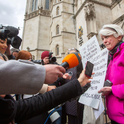In January 1990 Gordon Kaye, star of the television comedy series 'Allo 'Allo, suffered severe head injuries in a freak accident. Driving his car in London during a gale, a piece of wood detached itself from a billboard hoarding and smashed through his windscreen.
A few weeks later, reporters from The Sport inveigled themselves into the private hospital room where Kaye was recovering. They took photographs and conducted an interview with Kaye, although he was not making much sense.
Kaye's agent applied to the court for an injunction to prevent publication of any of this material. The judge at first instance granted the injunction. The Sport appealed against the judge's order, and the court of appeal reluctantly accepted the challenge, complaining that it was powerless to prevent The Sport from profiting from its "monstrous" invasion of Kaye's privacy. Lord Justice Glidewell said: "It is well known that in English law there is no right to privacy, and accordingly there is no right of action for the breach of a person's privacy. The facts of the present case are a graphic illustration of why parliament should consider whether and in what circumstances provision can be made to protect the privacy of individuals."
However, contrary to the received wisdom articulated by Lord Justice Glidewell, a right to privacy and a weapon for enforcing it already exist. What is more, in recent years the courts have been protecting this right with increasing vigour, even before the death of Princess Diana caused a surge of support for privacy legislation.
The right to privacy, which has lain dormant since the late 19th century, was expressly recognised by Lord Chancellor Cottenham in his judgement in favour of Prince Albert, husband of Queen Victoria, who had sued to prevent a printer called Strange from publishing any description of a collection of sketches that Albert and Victoria had made for their private amusement.
Prince Albert v Strange proved to be one of the springboards for the development in the US of a right to privacy known as "the right to be let alone." There was no parallel development in England because the law of confidence was perceived to confer sufficient protection against unwarranted invasions of privacy.
The law of confidence protects information which comes to the knowledge of a person in circumstances where he knows that the information is confidential and should not be disclosed. Since the Kaye fiasco, this law has been wielded with growing zeal and has become a de facto privacy law. Indeed, the courts have extended the boundaries of the law of confidence, and hence of privacy protection, by arguing that a person can be prevented from disclosing information simply because he knows he should not have acquired it. Whether the information is truly confidential is increasingly becoming irrelevant.
This trend has been particularly obvious where the press was seeking to gratify the public's appetite for gossip. Plaintiffs more or less in the public eye, including people connected to the royal family, have enjoyed unprecedented success recently in obtaining injunctions against tabloid newspapers to prevent publication of revelations about their sex lives.
In the past, plaintiffs would not have been able to prevent such exposures because, on principle, a court would not enforce a duty of confidence in matters which have "a gross immoral tendency." But the courts have declared that in today's society there is no common view that sexual conduct of any kind between consenting adults is grossly immoral. Furthermore, if the sexual conduct of the plaintiff is not so morally shocking as to prevent the press from publishing the details of it, then it cannot be so shockingly immoral as to disqualify the information from protection.
The Duchess of York was unlucky-her embarrassment came just before this new trend. Five years ago she tried to prevent publication of photographs which showed her topless foreplay with John Bryan. The pictures had been secretly taken with a telephoto lens. The Duchess of York failed to get an injunction because the judge hearing the case said that no right of hers had been infringed. But, within a few years, this was flatly contradicted by another judge: "If someone with a telephoto lens were to take from a distance and with no authority a picture of another engaged in some private act, his subsequent disclosure of the photograph would... as surely amount to a breach of confidence as if he had found or stolen a letter or diary and proceeded to publish it."
The European convention on human rights is destined to be incorporated into English law through the Human Rights Bill, which is presently before parliament. The Englishman's right to privacy, which was acknowledged in the last century but not in this one until now, will be re-affirmed. Article eight of the convention stipulates: "Everyone has the right to respect for his private and family life, his home and his correspondence." Fears have been expressed that article eight will be used by the courts to muzzle the media. But article eight is counter-balanced by article ten, which guarantees freedom of expression; and press freedom has already been curbed under the guise of the law of confidence.












